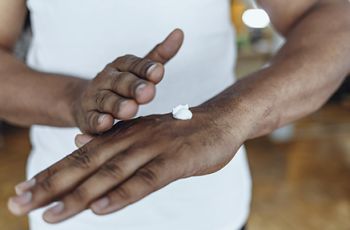Rahul Vanjani claims he has a hard time acting normal. In fact, it’s a leading reason the third-year medical student is attracted to a career in pediatrics. Around kids, he explains, “you can be goofy.”
But what to Vanjani might be simply “not ordinary,” to others is extraordinary —“others” most recently being the American Medical Association (AMA) Foundation, who named Vanjani a 2011 Excellence in Medicine Leadership Award recipient, Feb. 8. Given to only 24 medical students nationwide, the award recognizes strong, non-clinical leadership skills in advocacy, community service, and/or education. He is the first GW medical student to receive the award since 2003.
“Rahul’s commitment to the community and leadership of service efforts are unparalleled,” said Scott Schroth, M.D., M.P.H., senior associate dean of Academic Affairs. “He exemplifies the sort of creativity and dedication that we look for in medical students at GW, and we are extraordinarily proud of him as a winner of the AMA Foundation’s 2011 Leadership Award.”
Around the GW campus, Vanjani may be most recognized as the former co-director of the Health, Education, Active Living (HEALing) Clinic, a student-run health clinic that provides primary care in underserved neighborhoods in the District. “The clinic,” he says, “was great because it taught me to be very systematic in my approach to problems.”
“I tried to set the standard that, no matter how big or small the issue at hand, we would always have a healthy debate,” explains Vanjani of his management style. “I think it’s important to foster communication and to build consensus to come up with the best solution — and we came up with a lot of great solutions that way.” One such solution — the clinic’s successful expansion to a second location in 2010 — is a case in point that Vanjani’s method worked.
Now that he and his co-director, Marissa Watts, have abdicated most of their HEALing clinic responsibilities — a move Vanjani admits was “sad but good, because we were exhausted”— Vanjani is refocusing his service efforts on his own non-profit organization, Seeding Communities, which he founded as a college freshman. “Seeding Communities is not about planting trees,” he explains. “It’s about promoting maternal and child health in rural areas abroad.”
In 2006, Seeding Communities bought and donated an ambulance to an HIV/AIDS clinic in New Delhi, India, where patients in need of critical care had previously been transported via auto-rikshaw. In 2008, the organization established an art therapy program at a free health clinic in Kampala, Uganda. Now, Vanjani and his team — which is comprised of medical students, residents, and attending physicians; in addition to several lawyers and consultants — are in the midst of their biggest project to date: establishing a comprehensive maternal and child health care program in the Krishnagiri District of Tamil Nadu, India.
“This district is a great setting for our program because it has a higher maternal and child mortality rate than the national average — and the national average is already extremely high,” says Vanjani. Plus, he adds, the availability of a vacant community clinic in the area was almost fateful. “It is this huge beautiful white building just there, waiting for us.”
Meanwhile, of course, Vanjani is living the frenzied life of a “normal” third-year medical student on rotation. He is looking forward to publishing a study about medication adherence among HIV-positive patients, a project he designed with fellow medical student Caitlin Pedati under the direction of Gary Simon, M.D., Ph.D., M.A.C.P., Walter G. Ross Professor of Clinical Research in the GW School of Medicine and Health Sciences. Like most of his achievements, Vanjani attributes the success of the study — which was awarded last year at GW’s Research Day — to his classmates, 20 of whom helped him conduct it.
“This process was one of my favorite endeavors because it’s a good example of how students at GW come together to affect change in the community,” he says. “At the end of the day, the best part about GW is the people, my friends in my medical school class. I think I learn more from them than from any other source.”


